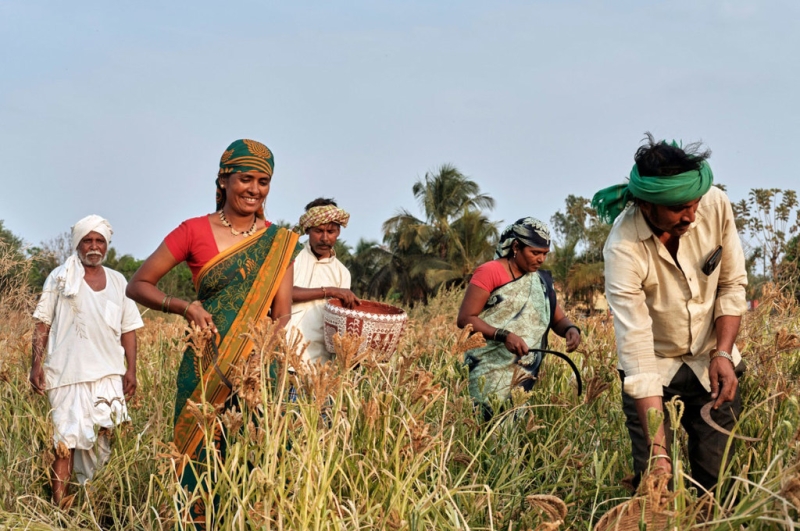- Shahidul Alam Vows to Reach Gaza Despite Israeli Obstacles |
- UN Urged to Act on Palestinian Rights Without Delay |
- Saudi Arabia Introduces New Licensing for Hajj Accommodations |
- UK Pledges Aid to Support Rohingya Refugees and Host Communities |
- Investors and Officials Challenge Elon Musk’s $1 Trillion Pay |
Indigenous Peoples Day Highlights AI’s Risks and Opportunities

© Equator Initiative/Bibifathima Swa Sahaya Sangha The 2025 Equator Prize winners exemplify this year’s theme, “Nature for Climate Action,” with a special focus on youth- and women-led climate action..
In honour of the International Day of the World’s Indigenous Peoples on 9 August, the UN hosted a virtual commemoration on Friday on the theme AI: Defending Rights, Shaping Futures.
An estimated 476 million Indigenous Peoples live across 90 countries, representing 5,000 different cultures.
Without proper safeguards, AI risks harming Indigenous rights through the inequitable distribution of this groundbreaking technology, environmental damage, and the reinforcement of harmful colonial legacies.
The growing amount of electricity generation needed for AI data centres and other infrastructure is also intensifying climate change pressures, according to the UN.
When situated near Indigenous Peoples’ lands, AI data sites can exacerbate environmental degradation, negatively affecting the ecosystems they depend on.
Moreover, decisions on AI are often made by governments and major tech companies without any consultation with Indigenous Peoples. This has meant that Indigenous languages, knowledge, and culture are regularly included in AI datasets without consent, perpetuating patterns of appropriation and misrepresentation.
Despite the challenges and risks, AI also presents new opportunities. Worldwide, Indigenous Peoples are exploring the use of AI as a tool for preserving intergenerational knowledge, empowering youth, and safeguarding culture, language, and identity.
Safeguards for, and innovations from, Indigenous Peoples in the realm of AI are the focus of this year’s International Day of the World’s Indigenous Peoples, as well as the recipients of the Equator Prize.
2025 Equator Prize
To commemorate the day, the UN Development Programme (UNDP) announced the ten community-based, Indigenous-led organisations that will receive the 2025 Equator Prize.
This award honours environmentally grounded solutions led by Indigenous Peoples that promote sustainable development, with winners demonstrating this year’s prize theme, Nature for Climate Action.
Winners will receive $10,000, be honoured at a high-level online ceremony later this year, and may join global events, including the UN General Assembly and the UN Climate Change Conference, COP30, taking place in Brazil later this year.
Prize recipients
The Latin American recipients include Cooperativa de Mujeres Artesanas del Gran Chaco (COMAR) in Argentina, Associação Uasei dos Povos Indígenas de Oiapoque (Uasei) in Brazil, the Hakhu Amazon Foundation in Ecuador, and the First Agrobiodiversity Zone in Peru.
COMAR supports Indigenous women through Matriarca, a brand turning traditional crafts into sustainable products. Uasei fosters an Indigenous-led bioeconomy around native açaí, while Hakhu defends the Ecuadorian Amazon and Indigenous rights through advocacy, decolonial education, and grassroots media.
In India, Bibifathima Swa Sahaya supports village farmers through multi-cropping, seed banks, and solar-powered processing – combining traditional knowledge with regenerative agriculture and renewable energy.
In Indonesia, Mitra BUMMA supports community enterprises protecting 100,000 hectares of rainforest while also boosting local economies and governance. The Ranu Welum Foundation empowers Indigenous Dayak communities through forest conservation and cultural preservation.
In Papua New Guinea, Sea Women of Melanesia Inc. empowers women to lead marine conservation by combining traditional knowledge with modern science.
In Africa, Nature and People As One in Kenya empowers pastoralist communities to restore drylands using traditional knowledge and affordable restoration methods, while Sustainable Ocean Alliance Tanzania restores marine ecosystems through sustainable seaweed farming and empowers coastal communities.
“On this important day, the 2025 Equator Prize winners are a reminder of the importance of honouring and recognising the vision and leadership of Indigenous Peoples and local communities,” said Marcos Neto, UN Assistant Secretary-General and Director of UNDP’s Bureau for Policy and Programme Support.

